|
| |

|
A
- My
books/videos related to
JFK Assassination |
1
2
3
4
5
6 7
8
|
Books 301 - 350 |
The
Schweiker-Hart Report
[The Investigation of the Assassination of President John F.Kennedy:
Performance of the Intelligence Agencies] |
 |
AA.VV.
1976 |
The Senate Select
Committee to Study Governmental Operations with Respect to Intelligence
Activities, known as the "Church Committee" after its chairman Frank
Church, conducted a wide-ranging investigation of the intelligence
agencies in the post-Watergate period.
The Church Committee took public and private testimony from
hundreds of people, collected huge volumes of files from the FBI, CIA,
NSA, IRS, and many other federal agencies, and issued 14 reports in 1975
and 1976.
This Senate Select Committee "Book 5" report (issued in April 1976), often
referred to as the Schweiker-Hart Report after its authors,
discusses the performance of the CIA and FBI in the investigation of the
assassination of President Kennedy. The report analyzes the general
question of whether and by what degree the CIA and FBI withheld relevant
information from the Warren Commission, which was charged with
investigating Kennedy’s murder. Among the information unknown to the
Warren Commission (except Commissioner Allen Dulles) were the CIA’s plots
to kill Fidel Castro. With the public disclosure of these plots, the idea
that Castro “struck back” gained prominence with many at the time. The
Committee found that the evidence “indicates that the investigation of the
assassination was deficient” and “impeaches the process whereby the
intelligence agencies arrived at their own conclusions.” |
|
The Search for
Lee Harvey Oswald |
 |
Groden Robert J.
1995 |
This book is the first
complete photo-biography of Lee Harvey Oswald. It presents nearly every
relevant photograph of the alleged assassin of President John F.Kennedy,
from his childhood to his death, including more than 600 photos. |
|
The Skeptic's
Guide to Conspiracies |
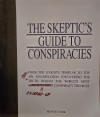 |
Monte Cook
2009 |
"From the Knights Templar
to the JFK Assassination: uncovering the truth behind the world's most
conspiracy theories".
Monte Cook takes a look at conspiracy theories—ranging from the
historically complex to the seriously whacked out. With a disbelieving
eye, he traces the history of some of the world's weirdest ideas and even
includes a chart showing readers how to make up conspiracy theories for
themselves.
Scattered through the book are the paranoid "notes" of an anonymous reader
who claims to know what's really going on. You can make up your own mind
as to who's telling the truth! |
|
The Texas
Connection |
 |
Zirbel Craig I.
1991 |
Conspiracy book from Craig
I.Zirbel.
From back cover:
"Using actual evidence, shocking conversations and written correspondence,
conspiracy expert Craig I.Zirbel presents a graphic view of the Kennedy
Assassination that will change the way you think about our government
forever.
'The Texas Connection' exposes a network of extraordinarily wealthy,
powerful anti-Kennedy Texans who had the opportunity to recruit Oswald, to
have Oswald killed and get exactly what they always wanted : the White
House in the hands of one of their own". |
|
The Trial of
Lee Harvey Oswald |
 |
Thompson Robert E.
1977 |
What if Lee Harvey Oswald
had lived to stand trial for the assassination of President John
F.Kennedy?
This book is the screenplay by Robert E.Thompson of an ABC-TV Production,
starring Ben Gazzara and Lorne Greene. |
|
The Trial of
Lee Harvey Oswald |
 |
VHS
|
What
would have happened if the world's most infamous assassin had not been
murdered in Dallas? It would have been one of the most revealing criminal
trials in American history. But a single gunshot prevented it from taking
place. This extraordinary drama dares to ask what would have happened if
Lee Harvey Oswald had lived to stand trial for the assassination of JFK. A
respected cast, including Lorne Greene and Ben Gazzarra (who bears a
striking resemblance to the real Oswald) bring this hypothetical scenario
to life. |
The Truth and its consequences
[A review of
two works on the JFK Assassination] |
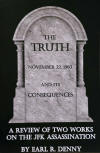 |
Earl R.Denny
2023
|
This book is a review and summary of two explosive and seminal works
regarding the Kennedy assassination and its aftermath.
Part I, “The Truth,” was the work of Nord Davis. His publication “Dallas
Conspiracy” is a compelling narrative, which provides a clear description
of the complex inter-relationships of the many who were involved, both
directly and in the periphery. It provides many of the answers that have
been hidden from the American people. Nord was a Navy Korean War veteran,
a dedicated truth-seeker, and an American patriot.
Part II, “Consequences,” is a review of The Hit List by Richard Belzer and
David Wayne. It delves even further into these unsolved deaths, including
many whose connections to the assassination were tenuous. It is both
riveting and shocking in that it demonstrates the long arm of those who
sought to silence anyone who might have known too much.
While “Dallas Conspiracy” provides clarity to the assassination—the
gunman’s identity, means, and possible motives—The Hit List demands a
scrutiny of subsequent occurrences and deaths, which appear to be
connected to the original event.
These two books, when brought together, provide a broader perspective. It
is a storyline that continues to this day, a story not yet fully told. |
|
The unanswered
questions about President Kennedy's Assassination |
 |
Fox Sylvan
1975
|
Conspiracy book written in 1965 by Pulitzer Prize Winner Sylvan Fox and
then revised in this 1975 edition.
From back cover:
"Over a decade after the tragedy, the disturbing questions linger. This
was the first book to ask them in public. The story it tells, now fully
revised to include all the latest evidence, is still the most shocking
account of high-level negligence and deception in our history." |
|
The Warren
Commission Executive Session Transcripts |
 |
AA.VV.
1964 |
The Warren Commission met
several times in executive session. The transcripts of these sessions were
made public over the years and are now available in complete unedited
form. The early transcripts include discussions of "problems" facing the
Commission, including the allegation that Lee Oswald was a paid FBI
informant.
The September 18 document is in the form of minutes rather than a
transcript. At this meeting Senator Russell voiced his doubts about the
report to be issued, and tried to get a dissenting opinion included. He
relayed his frustrations in a phone call to President Lyndon Johnson that
evening, a tape of which is now public. The minutes give no indication of
the conflict at this meeting, other than a vague and cryptic sentence on
the 3rd page. |
|
The Warren
Commission Report |
 |
AA.VV.
1964 |
President Lyndon
B.Johnson, by Executive Order No.11130 dated November 29,1963 , created
this Commission to investigate the assassination on Nov.22,1963, of John
F.Kennedy, the 35th President of the United States. The President directed
the Commission to evaluate all the facts and circumstances surrounding the
assassination and the subsequent killing of the alleged assassin and to
report its findings and conclusions to him. |
|
The Warren
Commission Report : The Witnesses |
 |
AA.VV.
1964 |
President Lyndon
B.Johnson, by Executive Order No.11130 dated November 29,1963 , created
this Commission to investigate the assassination on Nov.22,1963, of John
F.Kennedy, the 35th President of the United States.
In this book, selected and edited from the Warren Commission's hearings by
"The New York Times" with an introduction by Anthony Lewis. |
|
The Warren
Commission - Hearings & Exhibits - Volume 1 |
 |
AA.VV.
1964 |
The
testimony and exhibits obtained by the Commission are printed in this
and the succeeding volumes, organized in the following order :
(1) Testimony before members of the Commission, in the order in which
it was taken.
(2) Testimony by sworn deposition or affidavit, grouped into four general
subject categories; the medical attention given to the President and the
Governor, identification of the assassin of President Kennedy, the
background of Lee Harvey Oswald, and the killing of Lee Harvey Oswald by
Jack L. Ruby on November 24,1963.
(3) Exhibits introduced in connection with the testimony before the
Commission in numerical order.
(4) Exhibits introduced in connection with sworn depositions and
affidavits, grouped alphabetically by name of witness.
(5) Other exhibits introduced before the Commission in numerical order.
Volume I of the Warren Commission Hearings and Exhibits volumes is
the first of 5 volumes of testimony taken by the Commission members in
Washington DC. There are 10 additional volumes of testimony and affidavits
taken by staff members in various locations, and 11 volumes of Exhibits.
Volume I consists largely of testimony by the Oswald family, including Lee
Oswald's wife Marina, his mother Marguerite, and his brother Robert. This
volume also contains testimony of James Martin, Marina's business manager
for a short time in the aftermath of the assassination. The testimony in
this volume was conducted between February 3 and February 27, 1964.
The testimony of the following witnesses is contained in volume I : Mrs.
Marina Oswald, the widow of Lee Harvey Oswald;
Mrs. Marguerite Oswald, Oswald’s mother;
Robert Edward Lee Oswald, Oswald’s brother;
and James Herbert Martin, who acted for a brief period as Mrs. Marina
Oswald’s business manager. |
|
The Warren
Commission - Hearings & Exhibits - Volume 2 |
 |
AA.VV.
1964 |
Volume II of the
Warren Commission Hearings and Exhibits volumes is one of 5 volumes of
testimony taken by the Commission members in Washington DC. There are 10
additional volumes of testimony and affidavits taken by staff members in
various locations, and 11 volumes of Exhibits.
Volume II consists of testimony from prominent Warren Commission critic
Mark Lane, Secret Service agents, Dealey Plaza witnesses to the
assassination, associates of Lee Oswald and witnesses to his purported
flight, the three autopsy physicians, and others. The testimony in this
volume was conducted between February 27 and March 19, 1964.
The testimony of the
following witnesses is contained in volume II: James
Herbert Martin, who acted for a brief period as the business manager of
Mrs.Marina Oswald;
Mark Lane, a New York attorney;
William Robert Greer,who was driving the President’s car at. the time of
the assassination;
Roy H.Kellerman, a Secret Service agent who sat to the right of Greer;
Clinton J.Hill, a Secret Service agent who was in the car behind the
President’s car;
Rufus Wayne Youngblood, a Secret Service agent who rode in the car with
then Vice President Johnson:
Robert Hill Jackson, a newspaper photographer who rode in a car at the end
of the motorcade;
Arnold Louis Rowland, James Richard Worrell. Jr., and Amos Lee Euins, who
were present at the assassination scene ;
Buell Wesley Frazier, who drove Lee Harvey Oswald home on the evening of
November 21, and back to work on the morning of November 22;
Linnie Mae Randle, Buell Wesley Frazier’s sister;
Cortlandt Cunningham, a firearms identification expert with the Federal
Bureau of Investigation;
William Wayne Whaley, a taxicab driver, and Cecil J. McWatters, a
busdriver, who testified concerning Oswald’s movements following the
assassination ;
Mrs. Katherine Ford, Declan I. Ford, and Peter Paul Gregory, acquaintances
of Lee Harvey Oswald and his wife;
Comdr. James J. Humes, Comdr. J. Thornton Boswell, and Lt. Col. Pierre A.
Finck, who performed the autopsy on the President
at Bethesda Naval Hospital;
and Michael R. Paine and Ruth Hyde Paine, acquaintances of Lee Harvey
Oswald and his wife. |
|
The Warren
Commission - Hearings & Exhibits - Volume 3 |
 |
AA.VV.
1964 |
Volume III of the
Warren Commission Hearings and Exhibits volumes is one of 5 volumes of
testimony taken by the Commission members in Washington DC. There are 10
additional volumes of testimony and affidavits taken by staff members in
various locations, and 11 volumes of Exhibits.
Volume III consists of testimony from Texas School Book Depository
employees, Dallas policemen, eyewitnesses to the assailant of slain police
officer J. D. Tippit, physicians from Parkland Hospital involved in the
futile attempt to save President Kennedy's life, ballistic experts, and
others. The testimony in this volume was conducted between March 19 and
April 1, 1964.
The testimony of the
following witnesses is contained in volume III: Ruth
Hyde Paine, an acquaintance of Lee Harvey Oswald and his wife;
Howard Leslie Brennan, who was present at the assassination scene;
Bonnie Ray Williams, Harold Norman, James Jarman, Jr., and Roy Sansom
Truly, Texas School Book Depository employees;
Marrion L. Baker, a Dallas motorcycle officer who was present at the
assassination scene;
Mrs. Robert A. Reid, who was in the Texas School Book Depository Building
at the time of the assassination ;
Luke Mooney and Eugene Boone, Dallas law enforcement officers who took
part in the investigative effort in the Texas School Book Depository
Building immediately following the assassination ;
Patrolman M. N. McDonald, who apprehended Lee Harvey Oswald in the Texas
Theatre;
Helen Markham, William W. Scoggins, Barbara Jeanette Davis, and Ted
Callaway, who were in the vicinity of the Tippit crime scene;
Drs. Charles James Carrico and Malcolm Perry, who attended President
Kennedy at Parkland Hospital;
Robert A. Frazier, a firearms identification expert with the Federal
Bureau of Investigation;
Ronald Simmons, an expert in weapons evaluation with the U.S. Army Weapons
Systems Division;
Cortlandt Cunningham, a firearms identification expert with the Federal
Bureau
of Investigation ;
and Joseph D. Nicol, a firearms identification expert with the Bureau of
Criminal Identification and Investigation of the Illinois Department of
Public Safety. |
|
The Warren
Commission - Hearings & Exhibits - Volume 4 |
 |
AA.VV.
1964 |
Volume IV of the
Warren Commission Hearings and Exhibits volumes is one of 5 volumes of
testimony taken by the Commission members in Washington DC. There are 10
additional volumes of testimony and affidavits taken by staff members in
various locations, and 11 volumes of Exhibits.
Volume IV consists of testimony from fingerprint experts and other expert
witnesses, physicians from Parkland Hospital involved in the treatment of
Governor Connally's wounds, Texas Governor Connally himself and his wife,
Dallas Police officers, Secret Service representatives, FBI agents who
dealt with Oswald prior to the assassination, and others. The testimony in
this volume was conducted between April 2 and May 5, 1964
The testimony of the
following witnesses is contained in volume IV: Sebastian
F. Latona, a fingerprint expert with the Federal Bureau of Investigation;
Arthur Mandella, a fingerprint expert with the New York City Police
Department:
Paul Morgan Stombaugh, a hair and fiber expert with the Federal Bureau of
Investigation;
James C. Cadigan, a questioned document examiner with the Federal Bureau
of Investigation;
Drs. Robert Roeder Shaw and Charles Francis Gregory, who attended Governor
Connally at Parkland Hospital ;
Governor and Mrs. John Bowden Connally, Jr.;
Jesse Edward Curry, chief, Dallas Police Department;
Capt. J. W. Fritz and Lts. T. L. Baker and J. C. Day of the Dallas Police
Department, who participated in the investigation of the assassination;
Lyndal L. Shaneyfelt, a photography expert with the Federal Bureau
of Investigation ;
Robert Inman Bouck, special agent in charge of the Protective Research
Section of the Secret Service;
Robert Carswell, Special Assistant to the Secretary of the Treasury;
Winston G. Lawson, a Secret Service agent who worked on advance
preparations for the President’s trip to Dallas;
Alwyn Cole, a questioned document examiner with the Treasury Department;
and John W. Fain, John Lester Quigley, and James Patrick Hosty, Jr.,
agents of
the Federal Bureau of Investigation who interviewed Oswald, or people
connected with him, at various times during the period between Oswald’s
return
from Russia in 1962 and the assassination. |
|
The Warren
Commission - Hearings & Exhibits - Volume 5 |
 |
AA.VV.
1964 |
Volume V of the
Warren Commission Hearings and Exhibits volumes is the last of 5 volumes
of testimony taken by the Commission members in Washington DC. There are
10 additional volumes of testimony and affidavits taken by staff members
in various locations, and 11 volumes of Exhibits.
Volume V consists of testimony from the directors of the FBI, CIA, and
Secret Service and their senior subordinates, ballistics experts from the
FBI and from the Army's Edgewood Arsenal, the head of the State Department
and employees of the U.S. Embassy in Moscow, Dallas Police Department
officers, and others including Marina Oswald, Jacqueline Kennedy, and Jack
Ruby. Ruby was interviewed in his Dallas jail cell by Commission members
Earl Warren and Gerald Ford, accompanied by general counsel J. Lee Rankin
and staff members Arlen Spector and Joseph Ball. The testimony in this
volume was conducted between May 6 and September 6, 1964 (the Warren
Report was delivered to President Johnson on September 24, 1964).
The testimony of the
following witnesses is contained in volume V: Alan
H.Belmont, assistant to the Director of the Federal Bureau of
Investigation ; Jack Rerill and V. J. Brian of the Dallas police, who
testified concerning conversations Revill had with James Patrick Hosty,
Jr., a special agent of the FBI ;
Robert A.Frazier, a firearms expert with the FBI :
Drs. Alfred Olivier, Arthur Dziemian, and Frederick W. Light, Jr., wound
ballistics experts with the U.S. Army laboratories at Edgewood Arsenal,
Md.;
J. Edgar Hoover, Director of the Federal Bureau of Investigation;
John A. JIcCone, Director of the Central Intelligence Agency ;
Richard M. Helms, Deputy Director for Plans of the Central Intelligence
Agency;
Thomas J. Kelley, Leo J. Gauthier, and Lyndal L. Shaneyfdt, who testified
concerning efforts to reconstruct the facts of the assassination ;
Mrs. John F. Kennedy ;
Jack Ruby ;
Henry Wade, district attorney of Dallas;
Sgt. Patrick ‘I’.Dean, of the Dallas police, who testified concerning a
conversation with Ruby;
Waggoner Carr, attorney general of Texas;
Richard Edward Snyder, John A.McVickar, Abram Chayes, Bernice Waterman,
and Frances G. Knight, of the U.SDepartment of State ;
Secretary of State Dean Rusk ;
Mrs. Lee Harvey Oswald ;
Harris Coulter, an interpreter with the Department of State ;
Robert Alan Surrey, a Dallas citizen who testified regarding his
relationship with General Walker;
.James J. Rowley, Chief of the U.S. Secret Service;
Robert Carswell, special assistant to the Secretary of the Treasury ;
Bernard William Weissman, who teatified concerning an advertisement signed
by him which appeared in the Dallas Morning News on November 221963 ;
Robert G. Klause, a Dallas citizen who testified regarding a “Wanted For
Treason” handbill;
Mark Lane, a New York attorney ;
President Lyndon B. Johnsan and Mrs. Lyndon B. Johnson ;
Llewellyn E.Thompson, former U.S. Ambassador to the Soviet Union, and
Secretary of the Treasury C. Douglas Dillon. |
|
The Warren
Commission - Hearings & Exhibits - Volume 6 |
 |
AA.VV.
1964 |
Volume VI of the
Warren Commission Hearings and Exhibits volumes is the first of 10 volumes
of testimony and affidavits taken in various locations by staff attorneys
for the Warren Commission. There are an additional 5 volumes of testimony
taken by Commission members in Washington DC, and 11 volumes of Exhibits.
The testimony of the
following witnesses is contained in volume VI: Drs.
Charles J. Carrico, Malcolm Oliver Perry, William Kemp Clark, Robert
Selson Jr Clelland, Charles Rufus Baxter, Marion Thomas.Jenkins, Ronald
Cog Jones, Don Tee1 Curtis, Fousd A.. Bashour, Gene Coleman Akin, Paul
Conrad Peters, Adolph Hartung Giesecke, Jr Jackie Hansen Hunt, Kenneth
Everett Salyer, and Martin G. White, who attended President Kennedy at
Parkland Hospital;
Drs. Robert Roeder Shaw, Charles Francis Gregory, George T. Shires and
Richard Brooks Dolany, who attended Governor Connally at Parkland Hospital
;
Ruth Jeanette Standridge, Jane Carolyn Wester, Henrietta M. Ross, R. J.
Jimison,
and Darrell C. Tomlinson, who testified concerning Governor Connally’s
stretcher; Diana Hamilton Bowron, JIarparet 11. Henchliffe, and Doris Mae
Selson, who testified concerning President Kennedy’s stretcher ;
Charles Jack Price, the Administrator of Parkland Hospital;
Malcolm 0. Couch, Tom C. Dil!ard, James Robert IYnderwood, James N.
Crawford, , Mary Ann Mitchell, Barbara Rowland, Ronald B. Fischer, Robert
Edwin Edlwards, Jean Lollis Hill, Austin L. Miller, Frank E. Reilly, Earle
V. Brown, Royce G. Skelton, S. M. Holland, J. W. Foster, J. C. White, Joe
E. Murphy, Roger D. Craig, George W. Rackley. Sr.,James Elbert Romark, Lee
E. Bowers, Jr., B. J. Martin, Bobby W. Hargis, Clyde A. Haygood, E. D.
Brewer. D. V. Harkness, J. Herbert Sawyer, and Gerald Dalton Henslee, who
were present at the assassination scene:
William H. Shelley, Nat A. Pinkston, Billy Nolan Lorelady, Frankie Kaiser,
Charles Douglas Girens, Troy Eugene West, Danny G. Arce, Joe R. Molina,
Jack Edwin Dougherty, Eddie Piper, Victoria Elizabeth Adams, Genera L.
Hine, and Doris Burns, employees of the Texas School Book Depository ;
Mary E. Bledsoe, William W. Whaley, and Mrs. Earlene Roberts, who gave
testimony conrerning Oswald’s movements following the assassination ;
and Domingo Benavides, and Mrs. Charles Davis, who were present in the
vicinity of the Tippit crime scene. |
|
The Warren
Commission - Hearings & Exhibits - Volume 7 |
 |
AA.VV.
1964 |
Volume VII of the
Warren Commission Hearings and Exhibits volumes is one of 10 volumes of
testimony and affidavits taken in various locations by staff attorneys for
the Warren Commission. There are an additional 5 volumes of testimony
taken by Commission members in Washington DC, and 11 volumes of Exhibits.
The testimony of the
following witnesses is contained in volume VII: Drs.
Johnny Calvin Brewer, Julia Postal, Warren H. Burroughs, Bob K. Carroll,
Thomas Alexander Hutson. C. T. Walker, Gerald Lynn Hill, J. JI. Poe, John
Gibson, James Putnam, Rio S. Pierce, Calvin Bud Owens, William Arthur
Smith, George Jefferson Applin, Jr., Ray Hawkins, Sam Guinyard. and Helen
Markham, who were present either in the vicinity of the Tipgit crime scene
or at the Texas
Theatre, where Lee Harley Oswald was arrested;
L. D. Montgomery, Marvin Johnson, Seymour Weitzman, W.R.Westbrook, Elmer
L. Boyd, Robert Lee Studebaker, C.N. Dhority, Richard M. Sims, Richard A.
Stovall, Walter Eugene Potts, John P. Adamcik, Henry M. Moore, F.M.
Turner, Guy F. Rose, W. E. Perry, Richard L. Clark, Don R. Ables, Daniel
Gutierrez Lujan, C. W. Brown, L. C. Grares, James R. Learelle, W. E.
Barnes, J. B. Hicks, Harry D. Holmes, James W. Bookhout, Manning C.
Clements, Gregory Lee Olds, H. Louis Nichols, and Forrest V. Sorrels, who
participated in or observed various aspects of the investigation into the
assassination ;
William J. Waldman and Mitchell J. Scibor, who testified concerning the
purchase of the rifle used in the assassination;
Heinz W. Michaelis, who testified concerning the purchase of the revolver
used
to kill Officer Tippit;
J. C. Cason, Roy S. Truly, Warren Caster, Eddie Piper, William H. Shelly,
and Mrs. Donald Baker, employees at the Texas School Book Depository
Building; Edward Shields, an attendant at a parking lot near the TSBD;
Thomas J. Kelley and John Joe Howlett of the Secret Service and J. C. Day,
J. W. Fritz, and Marrion L. Baker of the Dallas police, all of whom
participated in the investigation into the assassination ;
Mary Jane Robertson, a secretary with the Dallas police;
Lyndal L. Shaneyfelt, a photography expert with the Federal Bureau of
Investigation ;
James C. Cadigan. a questioned document expert with the Federal Bureau of
Investigation;
Earlene Roberts, housekeeper in the roominghouse occupied by Lee Harvey
Oswald at the time of the assassination :
Senator Ralph W. Yarborough, who was riding in the motorcade;
Kenneth O’Donnell, Lawrence F. O’Brien, and David F. Powers, assistants to
President Kennedy, who were riding in the motorcade and testified
concerning
the planning of the Dallas trip and the motorcade;
Clifton C. Carter, assistant to President Johnson, Earle Cabell, former
Mayor of Dallas, and Mrs. Earle Cabell, all of whom were riding in the
motorcade;
Philip L. Willis, James W.Altgens, and Abraham Zapruder. who took pictures
of the motorcade during the assassination, and Linda K. Willis, Philip L.
Willis’ daughter;
Buell Wesley Frazier, who drove Oswald home on the evening of November 21,
and back to work on the morning of November 22;
Joe Marshall Smith, Welcome Eugene Barnett, Eddy Raymond Walthers, James
Thomas Tague, Emmett J. Hudson, and Edgar Leon Smith, Jr., who were
present at the assassination scene :
Perdue William Lawrence, a Dallas police captain who testified concerning
the positioning of policemen along the motorcade route ;
Ronald G.Wittmus, a fingerprint expert with the Federal Bureau of
Investigation ; Robert A. Frazier, Cortlandt Cunningham. and Charles L.
Killion, firearms identification experts with the Federal Bureau of
Investigation;
Robert Brock. Mary Brock,and Harold Russell, who were present in the
vicinity of the Tippit crime scene:
and David Goldstein, the owner of a firearms store in Dallas. |
|
The Warren
Commission - Hearings & Exhibits - Volume 8 |
 |
AA.VV.
1964 |
Volume VIII of the
Warren Commission Hearings and Exhibits volumes is one of 10 volumes of
testimony and affidavits taken in various locations by staff attorneys for
the Warren Commission. There are an additional 5 volumes of testimony
taken by Commission members in Washington DC, and 11 volumes of Exhibits
The testimony of the
following witnesses is contained in volume VIII:
Edward Voebel, William E. Wulf, Bennierita Smith, Frederick S. O’Sullivan,
Mildred Sawyer, Anne Boudreaux, Viola Peterman, Myrtle Evans, Julian
Evans, Philip Eugene Vinson, and Hiram Conway, who were associated with
Lee Harvey Oswald in his youth ;
Lillian Murret, Marilyn Dorothea Murret, Charles Murret, John M. Murret,
and Edward John Pit, Jr., who were related to Oswald;
John Carro, Dr. Renatus Hartogs, and Evelyn Grace Strickman Siegel, who
came into contact with Oswald while he was in New York during his youth ;
Nelson Delgado, Daniel Patrick Powers, John E. Donovan, Lt. Col. A. G.
Folsom, Jr., Capt. George Donabedian, James Anthony Botelho, Donald Peter
Camarata, Peter Francis Connor, Allen D. Graf, John Rene Heindel, David
Christie Murray, Jr., Paul Edward Murphy, Henry J. Roussel, Jr., Mack
Osborne, Richard Dennis Call, and Erwin Donald Lewis, who testified
regarding Oswald’s service in the Marine Corps;
Martin Isaacs and Pauline Virginia Bates, who saw Oswald when he returned
from Russia; and Max E. Clark, George A. Bouhe, Anna N. Meller, Elena A.
Hall, John Raymond Hall, Mrs. Frank H. Ray (Valentina) ; and Mr.and Mrs.
Igor Vladimir Voshinin, who became acquainted with Oswald and/or his wife
after their return to Texas in 1962. |
|
The Warren
Commission - Hearings & Exhibits - Volume 9 |
 |
AA.VV.
1964 |
Volume IX of the
Warren Commission Hearings and Exhibits volumes is one of 10 volumes of
testimony and affidavits taken in various locations by staff attorneys for
the Warren Commission. There are an additional 5 volumes of testimony
taken by Commission members in Washington DC, and 11 volumes of Exhibits.
The testimony of the
following witnesses is contained in volume IX:
Paul M.Raigorodsky, Natalie Ray, Thomas RI. Ray, Samuel B. Ballen, Lydia
Dymitruk,Gary E. Taylor, Bya A. Xamantov, Dorothy Gravitis, Paul Roderick
Gregory, Helen Leslie, George S. De Mohrenschildt, Jeanne De Mohrenschildt
and Ruth Hyde Paine, all of whom became acquainted with Lee Harvey Oswald
and/or his wife after their return to Texas in 1962;
John Joe Howlett, a special agent of the U.S. Secret Service;
Michael R. Paine, and Raymond Franklin Krystinik, who became acquainted
with Lee Harvey Oswald and/or his wife after their return to Texas in
1962. |
|
The Warren
Commission - Hearings & Exhibits - Volume 10 |
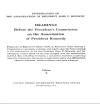 |
AA.VV.
1964 |
Volume X of
the Warren Commission Hearings and Exhibits volumes is one of 10 volumes
of testimony and affidavits taken in various locations by staff attorneys
for the Warren Commission. There are an additional 5 volumes of testimony
taken by Commission members in Washington DC, and 11 volumes of Exhibits.
The testimony of the
following witnesses is contained in volume X:
Everett D. Glover, who became acquainted with Lee Harvey Oswald following
his return to Texas in 1962 ;
Carlos Bringuier, Francis L. Martello, Charles Hall Steele, Jr., Charles
Hall Steele, Sr., Philip Geraci III, Vance Blalock, Vincent T. Lee, Arnold
Samuel Johnson, James J. Tormey, Farrell Dobbs, and John J. Abt, who
testified concerning Oswald’s political activities and associations ;
Helen P. Cunningham, R. L. Adams, Donald E. Brooks, Irving Statman, Tommy
Bargas, Robert L. Stovall, John G. Graef, Dennis Hyman Ofstein, and
Charles Joseph Le Blanc, who testified concerning Oswald’s employment
history ;
Adrian Thomas Alba, who was acquainted with Oswald in New Orleans in 1963;
Chester Allen Riggs, Jr., Mr. and Mrs. Mahlon F. Tobias, Sr., Mr. and Mrs.
Jesse J. Garner,Richard Leroy Hulen, Colin Barnhorst, and Mr. and Mrs.
Arthur Carl Johnson,who testifled concerning Oswald’s various residences;
and Clifton M. Shasteen, Leonard Edwin Hutchison, Frank Pizza, Albert Guy
Bogard, Floyd Guy Davis Virginia Louise Davis, Malcolm Howard Price, Jr.,
Garland Glenwill Slack, Dr. Homer Wood, Sterling Charles Wood, Theresa
Wood, Glenn Emmett Smith,W. W. Semingsen, and Laurance R. Wilcox, who
testified concerning contacts they believed they had with Oswald under
varying circumstances. |
|
The Warren
Commission - Hearings & Exhibits - Volume 11 |
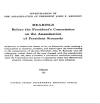 |
AA.VV.
1964 |
Volume XI of the Warren Commission Hearings and Exhibits volumes is one of 10
volumes of testimony and affidavits taken in various locations by staff
attorneys for the Warren Commission. There are an additional 5 volumes of
testimony taken by Commission members in Washington DC, and 11 volumes of
Exhibits.
The testimony of the
following witnesses is contained in volume XI:
John Edward Pie, Lee Harvey Oswald’s halfbrother ;
Edward John Pit, Jr., John Edward Pie’s father;
Kerry Wendell Thornley, a Marine Corps acquaintance of Oswald;
George B. Church, Jr., Mrs. George B. Church, Jr., and Billy Joe Lord, who
were on the boat Oswald took when he left the United States for Russia;
Alexander Kleinlerer, Mrs. Donald Gibson, Ruth Hyde Paine, Michael Ralph
Paine, and Gary Taylor, who became acquainted with Oswald and his wife
after their return to Texas in l962;
M. Waldo George, the Oswald’s landlord at Neely Street in Dallas;
William Kirk Stuckey, who gave testimony relating to Oswald’s political
views;
Horace Elroy Twiford and Estelle Twiford, who gave testimony relating to
the date and route of Oswald’s trip to Mexico in 1963;
Virginia H. James, James D. Crowley, James L. Ritchie, and Carroll
Hamilton Seeley, Jr., of the U.S. State Department;
Louis Feldsott, who gave testimony relating to the purchase of the C2766
rifle;
J. Philip Lux and Albert C. Yeargan, Jr., employees of sporting-goods
stores in Dallas;
Howard Leslie Brennan, who was present at the assassination scene;
Louis Weinstock, an official of the Communist Party, Vincent T. Lee, an
official of the Fair Play for Cuba Committee, and Farrell Dobbs, an
official of the Socialist Workers Party, who testified concerning contacts
Oswald had with their groups;
Virginia Gray, who gave testimony concerning a letter written by Oswald;
Albert F.Staples, who gave testimony concerning records relating to Marina
Oswald;
Katherine Mallory, Monica Kramer. and Rita Saman. who encountered Oswald
while touring Russia in 1961;
John Bryan McFarland, Meryl McFarland, and Pamela Mumford, who were on the
bus Oswald took to Mexico in the fall of 1963;
Dial Duwayne Ryder, Hunter Schmidt, Jr., Charles W. Greener, Gertrude
Hunter, Edith Whitworth, James Lehrer, and Mrs. Lee Harvey Oswald, who
gave testimony concerning an allegation that Oswald had taken a rifle to a
gun-repair shop in Dallas;
Eugene D. Anderson and James A. Zahm, of the U.S. Marine Corps, experts on
the subject of marksmanship;
C. A. Hamblen, Robert Gene Fenley and Aubreg Lee Lewis, who gave testimony
concerning an allegation that Oswald was sending and receiving telegrams
through a Dallas Western Union office;
Dean Adams Andrews, Jr., Evaristo Rodriguez, Orest Pena, Ruperto Pena, and
Sylvia Odio, who testified concerning contacts they believed they had with
Oswald in New Orleans and Dallas under various circumstances;
Edwin A. Walker, who testified concerning an attempt on his life on April
10, 1963, and his attorney, Clyde J. Watts;
Ivan D. Lee, an agent of the FBI, who gave testimony regarding photographs
which he took of General Walker’s residence;
Bernard Weissman, who paid for an advertisement concerning President
Kennedy which appeared in a Dallas newspaper on November 22, 1963;
Warren Allen Reynolds, who was present in the vicinity of the Tippit crime
scene; Priscilla Mary Post Johnson, who interviewed Oswald in Moscow ;
Eric Rogers, who lived in the same building as Oswald and his wife in New
Orleans in 1963; Bardwell D. Odum, James R. Malley, and Richard
Helms, who testified concerning a photograph which was shown to Marguerite
Oswald for purposes of identification;
Peter Megargee Brown, who testified concerning records relating to Oswald
when be lived in New York during his youth ;
Francis J. Martello of the New Orleans Police Department, who interrogated
Oswald in August l963;
John Corporon, an official of a New Orleans broadcasting station;
Mrs. J. V. Allen, who testified concerning the schooling of Oswald’s
brothers; Lillian Murret, Oswald’s aunt;
and John W. Burcham, Emmett Charles Barbe, Jr., Hilda L. Smith, J. Rachal,
Bobb Hunley, Robert J. Creel, Helen P. Cunningham, Theordore Frank Gangl,
Gene Graves, and Robert L. Adams, who testified concerning Oswald’s
employment history. |
|
The Warren
Commission - Hearings & Exhibits - Volume 12 |
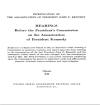 |
AA.VV.
1964 |
Volume XII of
the Warren Commission Hearings and Exhibits volumes is one of 10 volumes
of testimony and affidavits taken in various locations by staff attorneys
for the Warren Commission. There are an additional 5 volumes of testimony
taken by Commission members in Washington DC, and 11 volumes of Exhibits.
The testimony of the
following witnesses is contained in volume XII: Charles
Batchelor, Jesse E. Curry, J. E. Decker, W. B. Frazier, 0. A. Jones, Jack
Revill, James Maurice Solomon, M. W. Stevenson, and Cecil E. Talbert,
Charles Oliver Amett, Buford Lee Beaty, Alvin R. Brock, B. H. Combest,
Kenneth Hudson
Croy, Wilbur Jay Cutchshaw, Napoleon J. Daniels, William J. Harrison,
Harold
B. Holly, Jr., Harry M. Kriss, Roy Lee Lowery, Frank M. Martin, Billy Joe
Maxey, Logan W. Mayo, Louis D. Miller, William J. Newman, Bobby G.
Patterson, Rio S. Pierce, James A. Putnam, Willie B. Slack, Don Francis
Steele, Roy Eugene Vaughn, James C. Watson, G. E. Worley, and Woodrow
Wiggins, Dallas law enforcement officers who were responsible for planning
and executing the transfer of Lee Harvey Oswald from the Dallas City Jail
to the Dallas County
Jail;
and Don Ray Archer, Barnard S. Clardy, and Patrick Trevore Dean, who
participated in the arrest and questioning of Jack L. Ruby. |
|
The Warren
Commission - Hearings & Exhibits - Volume 13 |
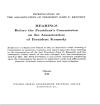 |
AA.VV.
1964 |
Volume XIII of
the Warren Commission Hearings and Exhibits volumes is one of 10 volumes
of testimony and affidavits taken in various locations by staff attorneys
for the Warren Commission. There are an additional 5 volumes of testimony
taken by Commission members in Washington DC, and 11 volumes of Exhibits.
The testimony of the
following witnesses is contained in volume XIII: L.
C. Graves, James Robert Learelle, L.D. Montgomery, Thomas Donald McMillon,
and Forrest V.Sorrels, who participated in the arrest and questioning of
Jack L. Ruby;
Dr. Fred A. Bieberdorf, Frances Cason, Michael Hardin, and C. E.Hulse, who
testified concerning the time at which Lee IIarrry Oswald was shot ;
Ira Jefferson Beers, Jr., Robert Leonard Hankal, Robert S. Huffaker, Jr.,
George
R. Phenix, and Jim Turner, news media personnel who observed the shooting
of
Oswald;
Harold R. Fuqua, Edward Kelly, Louis McKinzie, Edward E. Pierce, Alfreadia
Riggs, and John Olridge Serrance, janitorial employees of the Dallas
Municipal Building who gave testimony relating to the manner in which Ruby
may have entered the building;
A. M. Eberhardt, Sidney Evans, Jr., Bruce Ray Carlin, Karen Bennett
Carlin, Doyle E. Lane, Elnora Pitts, Hal Priddy, Jr., Huey Reeves, Warren
E. Richey, Malcolm R. Slaughter, Vernon S. Smart, John Allison Smith,
Jesse M. Strong, and Ira X. Walker, Jr., all of whom saw Ruby for brief
times during the period November 22-24, 1963, prior to the shooting of
Oswald ;
John L. Daniels and Theodore Jackson, attendants at parking lots near the
point at which Ruby’s car was parked on Norember 24, 1963;
and Andrew
Armstrong, Jr., Bertha Cheek, and Curtis LaVerne Crafard, who were
acquainted
with Ruby prior to November 22,1963. |
|
The Warren
Commission - Hearings & Exhibits - Volume 14 |
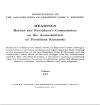 |
AA.VV.
1964 |
Volume XIV of the
Warren Commission Hearings and Exhibits volumes is one of 10 volumes of
testimony and affidavits taken in various locations by staff attorneys for
the Warren Commission. There are an additional 5 volumes of testimony
taken by Commission members in Washington DC, and 11 volumes of Exhibits.
The testimony of the
following witnesses is contained in volume XIV: Curtis
LaVerne Crafard, Wilbyrn Waldon (Robert) Litchfield II, Robert Carl
Patterson, Alice Reares Sichola, Ralph Paul, George Senator, Sancy Perrin
Rich, Breck Wall (Billy Ray Wilson), Joseph Alexnnder Peterson, Harry N.
Olsen,
and Kay Helen Olsen, all of whom were friends, acquaintances, employees,
or
business associates of Jack L. Ruby;
Earl Ruby and Sam Ruby, two of Ruby’s brothers, and Mrs. Eva Grant, one of
his sisters;
Jack L. Ruby;
Dr. William Robert Bearers, a psychiatrist who examined Ruby;
and Bell P. Herndon, an FBI polygraph expert who administered a polygraph
test to Ruby. |
|
The Warren
Commission - Hearings & Exhibits - Volume 15 |
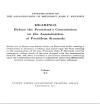 |
AA.VV.
1964 |
Volume XV of
the Warren Commission Hearings and Exhibits volumes is the last of 10
volumes of testimony and affidavits taken in various locations by staff
attorneys for the Warren Commission. There are an additional 5 volumes of
testimony taken by Commission members in Washington DC, and 11 volumes of
Exhibits.
This volume also contains an index of the Commission Exhibits published in
the remaining 11 of the 26 volumes of Warren Commission Hearings and
Exhibits (XVI through XXVI).
The testimony of the following witnesses is contained in volume XV: Hyman
Rubenstein, a brother of Jack L. Ruby;
Glen D. King, administrative assistant to the chief of the Dallas police;
C. Ray Hall, an FBI agent who interviewed Ruby;
Charles Batchelor. assistant chief of the Dallas police;
Jesse E. Curry, chief of the Dallas police;
M.V. Stevenson, deputy chief of the Dallas police;
Elgin English Crull, city manager of Dallas;
J.W. Fritz, captain in charge of the Dallas Homicide Bureau;
Roland A. Cox, a Dallas policeman;
Harold J. Fleming, vice president of the Armored Motor Car Service of
Dallas, and Don Edward Goin, Marvin E. Hall and Edward C. Dietrich,
employees of the
Armored Motor Car Service ;
Capt. Cecil E. Talbert of the Dallas Police Department, who was in charge
of the patrol division on November 26, 1963;
Marjorie R. Richey, James Thomas Aycox, Thomas Stewart Palmer, Joseph
Weldon Johnson, Jr., Edward J. Pullman, Herbert B. Kravitz, Joseph Rossi,
Norman Earl Wright, Lawrence V. Meyers, William D. Crowe, Jr., Nancy
Mennell
Powell, Dave L. Miller and Russell Lee Moore (Knight), former employees,
business associates, friends, or acquaintances of Ruby;
Eileen Kaminsky and Eva L. Grant, sisters of Ruby ;
George William Fehrenbach, a purported acquaintance of Ruby ;
Abraham Kleinman, Ruby’s accountant ;
Wanda Yvonne Helmick, an employee of a business associate of Ruby ;
Kenneth Larry Dowe, who talked to Ruby over the telephone on November 23,
1963;
T. M. Hansen, Jr., a Dallas police officer;
Nelson Benton, a Dallas news reporter who spoke with Chief Curry on the
morning of November 26;
Frank Bellocchio. an acquaintance of Ruby, who spoke with him on November
23, 1963;
Alfred Douglas Hodge, an acquaintance of Ruby ;
David L. Johnston, the justice of the peace who arraigned Oswald for the
murder of President Kennedy and Officer Tippit, and who also gave
testimony concerning Ruby’s whereabouts on November 22,1963 ;
Stanley M. Kaufman, Ruby’s attorney, who spoke to him on November 23;
William S. Biggio and Clyde Franklin Goodson, Dallas police officers:
Roger C. Warner,a Secret Service agent who participated in the
investigation of the killing of Lee Harvey Oswald ;
Seth Kantor, Danny Patrick McCurdy, Victor F. Robertson, Jr., Frederic
Rheinstein, Icarus M. Pappas, John G. McCullough, Wilma May
Tice, John Henry Branch, William Glenn Duncan, Jr., Garnett Claud
Hallmark,
John Wilkins Newnam, Robert L. Norton, Roy A. Pryor, Arthur William
Watherwax, Billy A. Rea, Richard L. Saunders, Thayer Waldo, Ronald Lee
Jenkins, Speedy Johnson, and Roy E. Standifer, all of whom gave testimony
concerning Ruby’s whereabouts on November 22 and/or November 23, 1963;
William Kline and Oran Pugh, U.S. Customs officials who gave testimony
regarding their knowledge of Oswald’s trip to Mexico;
Lyndal L. Shaneyfelt, a photography expert with the FBI ;
and Bruce Ray Carlin, Mrs. Bruce Carlin,and Ralph Paul, acquaintances of
Jack Ruby;
Harry Tasker, taxicab driver in Dallas;
Paul Morgan Stombaugh, hair and fiber expert, FBI;
Alwyn Cole, questioned document examiner, Treasury Department;
B. M. Patterson and L. J. Lewis, witnesses in the vicinity of the Tippit
crime scene ; Arthur Mandella, fingerprint expert, New York City Police
Department;
John F. Gallagher, FBI agent ;
and Revilo Pendleton Oliver, member of the council of the John Birch
Society. |
|
The Warren
Commission - Hearings & Exhibits - Volume 16 |
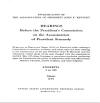 |
AA.VV.
1964 |
Volume XVI of
the Warren Commission Hearings and Exhibits is the first of the eleven
exhibits volumes. The set of 26 volumes consists of 5 volumes of testimony
taken by Commission members in Washington DC (volumes I to V), 10 volumes
of testimony and affidavits taken by Commission staff members in various
locations (volumes VI to XV), and the 11 volumes of exhibits (volumes XVI
to XXVI).
Most of the exhibits in this volume were introduced during the testimony
of the Oswald family: wife Marina, mother Marguerite, and brother Robert.
The remainder consists of some primary police evidence photos and some of
the medical exhibits introduced during the testimony of the autopsy
physicians.
This volume contains exhibits from 1 to 391. |
|
The Warren
Commission - Hearings & Exhibits - Volume 17 |
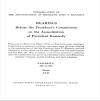 |
AA.VV.
1964 |
Volume XVII
of the Warren Commission Hearings and Exhibits is the second of the
eleven exhibits volumes. The set of 26 volumes consists of 5 volumes of
testimony taken by Commission members in Washington DC (volumes I to V),
10 volumes of testimony and affidavits taken by Commission staff members
in various locations (volumes VI to XV), and the 11 volumes of exhibits
(volumes XVI to XXVI).
The exhibits in this volume consists of medical exhibits related to both
President Kennedy and Governor Connally, letters between Ruth Paine and
Marina Oswald, photographs of the Paine and Randle homes, photographs of
the Texas School Book Depository building, various ballistics evidence,
cards carried by Lee Harvey Oswald, photographs from the Secret Service
re-enactment of the assassination, and more.
This volume contains exhibits from 392 to 884. |
|
The Warren
Commission - Hearings & Exhibits - Volume 18 |
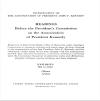 |
AA.VV.
1964 |
Volume XVIII of the
Warren Commission Hearings and Exhibits is the third of the eleven
exhibits volumes. The set of 26 volumes consists of 5 volumes of testimony
taken by Commission members in Washington DC (volumes I to V), 10 volumes
of testimony and affidavits taken by Commission staff members in various
locations (volumes VI to XV), and the 11 volumes of exhibits (volumes XVI
to XXVI).
The exhibits in this volume consists of black-and-white frames from the
Zapruder film and other films taken in Dealey Plaza, State Department
documents relating to Lee Harvey Oswald and his defection to the Soviet
Union, Secret Service reports and letters, and various documents relating
to General Walker, Larrie Schmidt, and other right-wing persons in the
Dallas area.
This volume contains exhibits from 885 to 1053. |
|
The Warren
Commission - Hearings & Exhibits - Volume 19 |
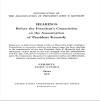 |
AA.VV.
1964 |
Volume XIX of the Warren Commission Hearings and Exhibits is one of the
eleven exhibits volumes in that set. The complete set of 26 volumes
consists of 5 volumes of testimony taken by Commission members in
Washington DC (volumes I to V), 10 volumes of testimony and affidavits
taken by Commission staff members in various locations (volumes VI to XV),
and the 11 volumes of exhibits (volumes XVI to XXVI).
Volume XIX is one of three volumes which contains exhibits tagged by the
name of a particular official or witness. It covers those whose last names
begin with the letters A through F. |
|
The Warren
Commission - Hearings & Exhibits - Volume 20 |
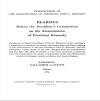 |
AA.VV.
1964 |
Volume XX of the
Warren Commission Hearings and Exhibits is one of the eleven exhibits
volumes in that set. The complete set of 26 volumes consists of 5 volumes
of testimony taken by Commission members in Washington DC (volumes I to
V), 10 volumes of testimony and affidavits taken by Commission staff
members in various locations (volumes VI to XV), and the 11 volumes of
exhibits (volumes XVI to XXVI).
Volume XX is one of three volumes which contains exhibits tagged by the
name of a particular official or witness. It covers those whose last names
begin with the letters G through O. |
|
The Warren
Commission - Hearings & Exhibits - Volume 21 |
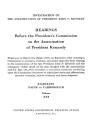 |
AA.VV.
1964 |
Volume XXI of the
Warren Commission Hearings and Exhibits is one of the eleven exhibits
volumes in that set. The complete set of 26 volumes consists of 5 volumes
of testimony taken by Commission members in Washington DC (volumes I to
V), 10 volumes of testimony and affidavits taken by Commission staff
members in various locations (volumes VI to XV), and the 11 volumes of
exhibits (volumes XVI to XXVI).
Volume XXI is the last of three volumes which contains exhibits tagged by
the name of a particular official or witness. It covers those whose last
names begin with the letters P through Z. |
|
The Warren
Commission - Hearings & Exhibits - Volume 22 |
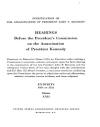 |
AA.VV.
1964 |
Volume XXII of the
Warren Commission Hearings and Exhibits is one of the eleven exhibits
volumes in that set. The complete set of 26 volumes consists of 5 volumes
of testimony taken by Commission members in Washington DC (volumes I to
V), 10 volumes of testimony and affidavits taken by Commission staff
members in various locations (volumes VI to XV), and the 11 volumes of
exhibits (volumes XVI to XXVI).
Volume XXII contains a large variety of documents generated by the FBI,
Secret Service, INS, and other government agencies, as well as newspaper
clippings, photographs, and other materials.
This volume contains exhibits from 1054 to 1512. |
|
The Warren
Commission - Hearings & Exhibits - Volume 23 |
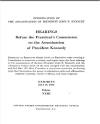 |
AA.VV.
1964 |
Volume XXIII of the
Warren Commission Hearings and Exhibits is one of the eleven exhibits
volumes in that set. The complete set of 26 volumes consists of 5 volumes
of testimony taken by Commission members in Washington DC (volumes I to
V), 10 volumes of testimony and affidavits taken by Commission staff
members in various locations (volumes VI to XV), and the 11 volumes of
exhibits (volumes XVI to XXVI).
Volume XXIII contains mostly of a large number of FBI reports, along with
other documents including schooling and employment records of Lee Harvey
Oswald.
This volume contains exhibits from 1513 to 1975. |
|
The Warren
Commission - Hearings & Exhibits - Volume 24 |
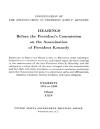 |
AA.VV.
1964 |
Volume XXIV of the
Warren Commission Hearings and Exhibits is one of the eleven exhibits
volumes in that set. The complete set of 26 volumes consists of 5 volumes
of testimony taken by Commission members in Washington DC (volumes I to
V), 10 volumes of testimony and affidavits taken by Commission staff
members in various locations (volumes VI to XV), and the 11 volumes of
exhibits (volumes XVI to XXVI).
Volume XXIV consists of a variety of reports from the FBI, Secret Service,
and Dallas Police, as well as transcripts of a few dozen television and
radio broadcasts from the assassination weekend.
This volume contains exhibits from 1976 to 2189. |
|
The Warren
Commission - Hearings & Exhibits - Volume 25 |
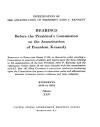 |
AA.VV.
1964 |
Volume XXV of the
Warren Commission Hearings and Exhibits is one of the eleven exhibits
volumes in that set. The complete set of 26 volumes consists of 5 volumes
of testimony taken by Commission members in Washington DC (volumes I to
V), 10 volumes of testimony and affidavits taken by Commission staff
members in various locations (volumes VI to XV), and the 11 volumes of
exhibits (volumes XVI to XXVI).
Volume XXV of a variety of FBI reports, photographs, and other documents.
It includes a number of reports related to the FBI investigation of Lee
Harvey Oswald's trip to Mexico City. Also included are excerpts of
testimony from the trial of Jack Ruby, photographs taken in the Soviet
Union and Dallas, phone call records relating to Jack Ruby, and more.
This volume contains exhibits from 2190 to 2651. |
|
The Warren
Commission - Hearings & Exhibits - Volume 26 |
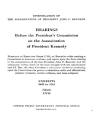 |
AA.VV.
1964 |
Volume XXVI of the
Warren Commission Hearings and Exhibits is the last of the eleven exhibits
volumes in that set. The complete set of 26 volumes consists of 5 volumes
of testimony taken by Commission members in Washington DC (volumes I to
V), 10 volumes of testimony and affidavits taken by Commission staff
members in various locations (volumes VI to XV), and the 11 volumes of
exhibits (volumes XVI to XXVI).
Volume XXVI consists of a variety of reports from the FBI, CIA, and other
federal agencies including the Secret Service and the State Department. It
also contains miscellaneous items such as reprints of newspaper articles,
transcripts of radio transmissions, and so on.
This volume contains exhibits from 2652 to 3154. |
|
The Warren
Commission Report + 26 volumes of hearings and exhibits |
 |
AA.VV.
1964 |
Original. Complete Warren
Commission Report + 26 volumes of hearings and exhibits (printed 1964).
The President's Commission on the Assassination of President Kennedy was
announced by President Johnson on November 29, 1963, one week after the
shots rang out in Dallas, and five days after alleged assassin Lee Harvey
Oswald was killed while in police custody.
A little under 10 months later, the "Warren Commission" delivered a
888-page Report. The Report found that Lee Harvey Oswald killed President
Kennedy, alone and unaided, and that similarly Oswald's killer Jack Ruby
was a "lone nut."
This Report was followed up a couple of months later by the publication of
26 volumes of Hearings and Exhibits. The Warren Report was widely hailed
by the media as an exhaustive study produced by honorable and prestigious
men, and was fairly widely accepted by the American public. The Warren
Commission published 26 volumes of hearings and exhibits within a few
months after issuing its Report. Volumes 1 - 5 are hearings conducted by
the Commission members in Washington DC. Volumes 6 - 15 are hearings
conducted by staff attorneys on location in Dallas, New Orleans, and other
locations. Volume 15 also contains an index to names and exhibits. Volumes
16 - 26 contain photographed Commission Exhibits, usually abbreviated to
CE |
|
The Zapruder Film
: Reframing JFK's Assassination |
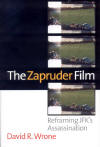 |
Wrone David R.
2003 |
It is
the most famous home movie of all time, the most closely analyzed 26
seconds of film ever shot, the most disturbing visual record of what many
have called "the crime of the century".
In 486 frames Abraham Zapruder's iconic film captures from beginning to
the end the murder of President John F. Kennedy in broad daylight. David
Wrone, one of foremost authorities on the assassination, re-examines
Zapruder's film with a fresh eye and a deep knowledge of the forensic
evidence. |
"They've have
killed the President!"
[The search for
the murderers of John F.Kennedy] |
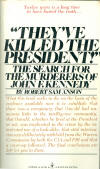 |
Anson Robert Sam
1975 |
From
the cover:
"Twelve years is a long time to have buried the truth....
What this book seeks to do, on the basis of the evidence available now, is
to establish: that there was a conspiracy; that Oswald had numerous links
to the Intelligence community; that Oswald, whether he fired or not, was
implicated in the crime by the intentional use of a look-alike; that vital
information was deliberately withheld from the Warren Commission by both
the CIA and FBI and that a cover-up followed.
The final conclusions are left for you to draw." |
Tippig Point
[The conspiracy
that murdered President John Kennedy] |
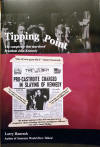 |
Larry Hancock
2021 |
Tipping Point begins with an examination of
what decades of research, and the work of both the House Select Committee
on Assassinations and the Assassinations Records Review Board, have
revealed in regard to critical issues with the official story of President
Kennedy’s assassination. That overview reveals the details of extensive
problems with the evidentiary and forensics information presented in the
Warren Commission Report - and demonstrates why it is neither credible nor
even suitable for a serious study of President Kennedy’s assassination.
The reality of the Warren Commission's failure is that the standard
approach to understanding the assassination is simply not feasible. You
literally can’t get to the truth using what was entered into evidence and
into the national archives. While this may seem shocking to someone new to
the assassination, it was acknowledged even in private remarks by the
deceased President’s closest family members and friends.
Fully acknowledging that problem, Tipping Point takes a fresh approach,
revealing the actual conspiracy though the words and remarks of a handful
of people who had a limited knowledge of both the plot and insights into
how it was organized and executed. While those people will be new to most
readers, they are not unknown or unknowable; we now have documents which
present their backgrounds, their connections and the context in which the
conspiracy they describe evolved.
Tipping Point takes readers through a chronology of events, year by year
and ultimately in the final 90 days of fall, 1963 as the attack in Dallas
came together. It addresses the people, the motives and mechanics of that
attack - exposing specifically why those involved were moved to act
against the president. In doing so it demonstrates exactly why President
Kennedy had to be eliminated, not politically but in an act of murder. |
|
Trauma Room One :
the JFK Medical Cover-up Exposed |
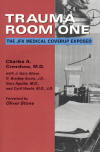 |
Crenshaw Charles A.
2001 |
The doctors who tried to
save President John F.Kennedy at Parkland Hospital in November of 1963
agreed - either out of respect or fear- not to publish what they had seen,
heard an felt. Then in 1990, one of the Dallas surgeons who worked in
Trauma Room One, Dr. Charles Crenshaw, decided after much deliberation
that the American people ought to know the truth. |
|
Trial of Lee Harvey
Oswald |
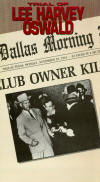 |
Buchanan Larrt (Director)
VHS
1964 |
On
November 24,1963 Lee Harvey Oswald was shot and killed by Jack Ruby. Lee
Harvey Oswald never received a trial. This film is an enactment based on
information and witness testimony that may have been presented during such
a trial. Oswald will be presented with actors portraying individuals who
may have appeared as witnesses. There is no jury except you, the members
of the audience.
This film was made in 1964, but suppressed from the public for many years. |
|
Truth Withheld - A
Survivor's Story |
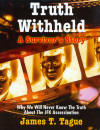 |
Tague James T.
2003 |
President John F.Kennedy
and Governor Connally were not the only ones afflicted by an assassin's
bullet that terrible November day, back in 1963. There was a third person
hit as a result of one of the shots that rang out in Dealey Plaza, and he
has finally come forward after 40 years to tell his "survivor's story". |
|
Tutta la verità su
Lee Harvey Oswald
[Parte prima]
|
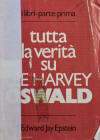 |
Edward Jay
Epstein
1978 |
First part of an excerpt
in Italian, published by Selezione dal Reader's Digest, of the famous book
"LEGEND [The secret world of Lee Harve Oswald]" by Edward Jay Epstein. |
|
Two Men in Dallas |
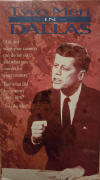
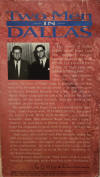 |
Mark Lane
VHS - 1987 |
From the back of the VHS
cover: The words
of Dallas Deputy Sheriff Roger Craig first appeared on the national
scenein the book "Rush to Judgement" written by Mark Lane and published
during 1966.
Now, almost three decades after the crime of the century, the voice of
Roger Craig is available for the first time as he recounts the crucial
events as he observed them on the day President Kennedy was killed. The
efforts to silence Roger Ctraig and the price he paid for his heroic
efforts to tell the nation the truth about the death of the president are
also chronicled here.
The interview with Roger Craigwas conducted by Mark Lane. Lane's recent
work "Plausible Denial"has joned his earler book "Rush to Judgement", as a
national bestseller.
Mark Labe observes "Roger Craig was a trained observer, an eyewitness to
historic events. He could not forget his obligation to speak truth to
power. Perhaps his commitment to that truth resulted in his death".
Mark Lane, who worked with John Kennedt duringh the 1960 Presidential
campaign, is universally regarded as the foremost researcher, investigator
and respected chronicler of the assassination. His work is responsible for
the refusal of the American people to accept the false conclusions of the
Warren Commission.
Lord Bertrand Russell wrote "Mark Lane's work is a great historical
contibution, greater that Zola in the Dreyfuss case". |
|
Ultimate Sacrifice |
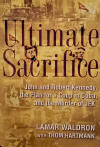 |
Lamar Waldron
with Thom Hartman
2005 |
"John
and Robert Kennedy, the plan for a Coup in Cuba and the Murder of JFK".
Ultimate Sacrifice reveals, for the first time, John and Robert Kennedy's
plan for a coup in Cuba on December 1, 1963 — a plan that involved a U.S.
military invasion. Unique, distinctly different, and far more advanced
than any previously disclosed operation, this plan is corroborated by many
declassified military and CIA documents that have never been quoted in any
book before. It provides the missing piece of the puzzle regarding JFK's
murder, and explains why Bobby Kennedy told close associates that the
Mafia was behind his brother's assassination.
The Mafia had managed to infiltrate the Kennedys' intended coup. Ultimate
Sacrifice describes and documents an attempt they made to kill JFK in a
motorcade several days prior to Dallas. This attempt had more than a dozen
parallels to Dallas.
Building on the work of the seven governmental committees that
investigated aspects of JFK's assassination, the four million documents
that were declassified in the 1990s, and exclusive interviews with many
Kennedy insiders, the authors are able to tell the full story of these
incidents. |
|
Unsolved History -
JFK: Death in Dealy Plaza |
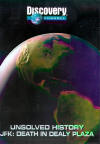 |
Discovery Channel
DVD |
On November 22, 1963, an obscure businessman – Abraham Zapruder – took his
8mm camera to a local park and shot a 26-second home movie. That film,
capturing the assassination of President Kennedy, is arguably the most
important film of the 20th Century. But did you know there were a dozen
other photographers who trained their cameras on the Presidential
motorcade?
Join the Unsolved History team as they piece together those stills and
flickering images to form a complete picture of the tragic events that
unfolded in Dallas. Hear from many of the original photographers as they
describe their unique viewing angle of the motorcade and the
assassination. Follow them as they visit Dealey Plaza, some of them for
the first time since that fateful day. Watch as the investigation team
recreates some of the original photography to ascertain how modern methods
might be better able to eliminate many of the conspiracy theories.
Finally, observe as the investigative team uses all available film from
that historic moment to assemble a seamless, celluloid timeline
documenting the Presidential motorcade – from the jubilant entry into
Dealey Plaza, to the tragic, final moments that forever changed the fabric
of America's culture. |
|
Warren Commission
Report |
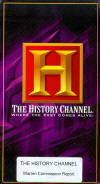 |
The History Channel
VHS
|
The members were among the
most respected men in the nation, led by the Chief Justice of the Supreme
Court, Earl Warren. Their task was to compile and present findings on the
"Crime of the Century," the assassination of John F. Kennedy.
But what was intended to be the definitive investigation of the case
instead became a lightning rod for controversy. Almost immediately after
its release, The Warren Report was under attack from all angles--some
called out overlooked evidence, others cried cover-up, and still others
poked holed in the procedures used to come to the findings. TIME MACHINE
examines how the report was created and talks to its supporters and
detractors. This video examines the many theories surrounding the document
and the men behind it for a comprehensive portrait of one of the most
controversial documents of the 20th century.
After all these years, the debate rages on: were the men of the Commission
honest investigators or the architects of an elaborate fraud? |
|
When the news
went live: Dallas 1963 |
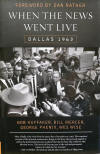 |
Bob Huffaker,
Bill Mercer, George Phenix, Wes Wise
2004
|
The minutes, hours, and
days after President John F. Kennedy was shot on November 22, 1963,
provided no ready answers about what was going on, what would happen next,
or what any of it meant. For millions of Americans transfixed by the
incomparable breaking news, television—for the first time—emerged as a way
to keep informed. But the journalists who brought the story to the
television airwaves could only rely on their skill, their experience, and
their stamina to make sense of what was, at the time, the biggest story of
their lives.
President Kennedy’s assassination was the first time such big breaking
news was covered spontaneously—this book tells the stories of four men who
were at the epicenter of it all. Bob Huffaker, Bill Mercer, George Phenix,
and Wes Wise were among those responsible for covering the assassination
and its aftermath for Dallas’s KRLD. These reporters fed news and footage
to Walter Cronkite and all of the other CBS affiliates around the country.
From the presidential motorcade to Parkland Hospital, from Lee Harvey
Oswald’s shooting to the trial and lonesome death of Jack Ruby, these men
were there, on the inside. The view they were afforded of these events was
unparalleled; the tales they have to tell, one-of-a-kind. |
1
2
3
4
5
6 7
8
Back to Top Back to Biagio's
Kennedy Home Page

Biagio Privitera's
Home Page. You can contact me at
biagio.privitera@gmail.com
|
